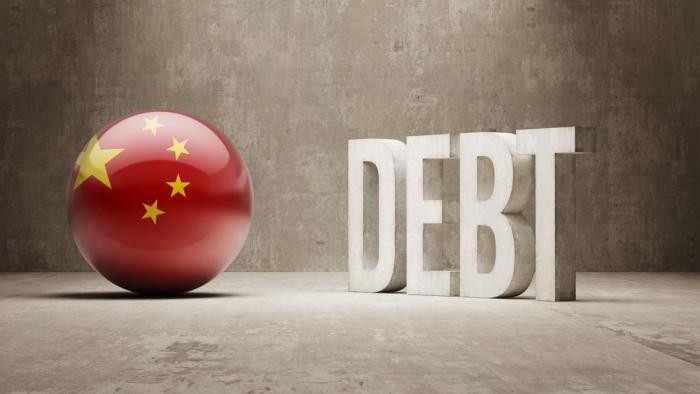
- The New York Times reports: "The first red alert over air pollution in the Chinese capital almost brought this city to a standstill in December, with schools shut, construction halted and driving restricted. Now, in a swift policy shift, Beijing plans to issue a red alert based on higher thresholds, despite government pledges to better address the toxic air. A red alert, the highest level of a four-tier warning system, will be issued if the daily average air quality index is forecast to exceed 500 for one day, 300 for two days or 200 for four days, Xinhua, the state news agency, reported on Sunday, quoting Beijing's environmental agency. The new standards will take effect before the end of March, it said."
Bloomberg writes that China's ratio of debt to its economic size is seen climbing for at least another four years, underscoring the risks facing policy makers as they strive to prevent a deeper slowdown without triggering a credit blowout. Seven out of 12 economists see the debt-to-gross-domestic-product ratio increasing through at least 2019, with four expecting a peak in 2020 or later, according to a Bloomberg News survey. Debt will peak at 283 percent of GDP, according to the median estimate of eight economists. Policy makers grappling with the fallout from a credit binge after the global financial crisis are also being confronted by anemic demand for exports and an aging workforce, pushing economic growth to the slowest pace in a quarter of a century. With robust consumption and services struggling to pick up the slack from slowing investment and manufacturing, China's communist leaders are striving to put a floor under growth to ensure average expansion stays around 6.5 percent through 2020."We doubt the debt ratio will peak before 2020," said Julian Evans-Pritchard, a China economist at Capital Economics Ltd. in Singapore. "Our model puts the peak in the debt ratio in 2024, but the ratio could rise further beyond that if Chinese policymakers fail to implement the necessary structural reforms required to improve credit allocation."
Wall Street Journal writes the removal of Xiao Gang as China's top securities cop marks the beginning of an overhaul of financial regulators in the face of a deepening economic slowdown, Chinese officials say. Mr. Xiao, who had been blamed for missteps during China's stock collapse last year, was replaced on Saturday by Liu Shiyu, a veteran of China's central bank, which is set to take a leading role in the financial refurbishing. At the China Securities Regulatory Commission, the passing of the baton was an amicable affair. As Mr. Liu, a former central-bank deputy governor who most recently headed one of China's largest state banks, took over the podium after a senior Communist Party official announced his appointment as the regulator's new chairman, he complimented Mr. Xiao for his hard work in the past three years, according to people with knowledge of the gathering. Mr. Liu and other senior commission officials even walked Mr. Xiao out of the commission's headquarters in downtown Beijing to show their camaraderie.
- 2016-02-19 China accuses US of militarizing South China Sea
- 2016-02-18 Apple Pay Launches in China Where e-Payments Widely Used
- 2016-02-17 China: Missiles have been on South China Sea island for years
- 2016-02-16 South China Sea takes center stage at U.S.-ASEAN summit
- 2016-02-15 Chinese premier says economy faces great challenges, new uncertainties
- 2016-02-14 China's bank chief defends currency regime as markets poised for another volatile week
- 2016-02-12 UK: Hong Kong bookseller ‘removed’ in breach of China treaty
- 2016-02-11 China warns on South China Sea as U.S., India consider patrols
- 2016-02-10 China breezes past EU as top wind power
- 2016-02-09 Demonstrators battle Hong Kong police over Chinese New Year treats
- The New York Times Beijing to Raise Threshold on Red Alerts for Smog
- Bloomberg Business China's Debt Seen Rising Through 2019, Peaking at 283% of GDP
- Wall Street Journal Change of Regulator Sets Stage for Overhaul of China's Markets
- Reuters UK India set to seal major power deal in Bangladesh, beating China
- CNN International Future Chinese skylines could look more uniform
- Reuters China stocks rise at market open after top stock regulator removed
- The Guardian China to build ventilation 'corridors' in Beijing to help tackle air pollution
- Financial Times China arms exports continue to surge
- Reuters China's Huawei backs Apple in fight over encryption
- Wall Street Journal Vietnam Adds Military Muscle as South China Sea Tensions Escalate
- Reuters China signals no South China Sea backdown as foreign minister goes to U.S.
- Reuters UK Beijing to raise threshold for issuing air pollution 'red alerts'
- Fortune China To Limit Land Available for Homes
- Wall Street Journal Chinese Military Spending, Ambitions Fuel Asian Arms Race, Studies Say
- The Diplomat 5 Myths About China's Missile Deployment on Woody Island
- The New York Times: Sinosphere China's Excess Production Has Intensified Slowdown, Business Group Says
- Financial Times Communication key to new China regulator's charm
- The Diplomat Debunking the Myths of Chinese Investment in Africa
- Forbes China's Pivot To Latin America: Beijing's Growing Security Presence In America's Backyard
- Reuters Paracels build-up a pointer to China's broader South China Sea ambitions
- Business Insider China is buying up American companies fast, and it's freaking people out
